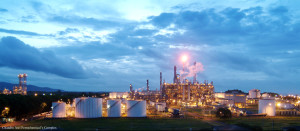 Indonesia’s Investment Coordinating Board (BKPM) will push investments that are focused on developing the raw materials needed in petrochemical, pharmaceutical and steel industries to boost the country’s manufacturing industry.
Indonesia’s Investment Coordinating Board (BKPM) will push investments that are focused on developing the raw materials needed in petrochemical, pharmaceutical and steel industries to boost the country’s manufacturing industry.
Himawan Hariyoga, the deputy director for promoting investment at BKPM, said that there’s been a downward trend in realized investments in the petrochemical, pharmaceutical and steel industries specifically in the past five years, and that has been largely due to the challenge in finding access to raw materials in the country.
Realized domestic direct investments in the pharmaceutical industry, for example, only reached Rp 750 billion ($60 million) last year, which is far smaller than the Rp 3.6 trillion in 2013, BKPM data showed. The same trend was seen in realized foreign direct investment, which declined by 31 percent to $885 million from $1.3 billion in 2013.
Meanwhile, there remains a total of Rp 280.4 trillion in domestic investment that are in the pipeline across all three sectors, while there are $8.92 trillion of projects in the pipeline from foreign direct investment, data from BKPM showed.
“As infrastructure development continues, the demand for steel will climb. Still, the industry is having a hard time getting their hands on the raw material, which is iron ore. … This is also faced by the pharmaceutical industry, which still has to import the ingredients,” Himawan said. “One petrochemical [company] that intends to plant a big investment in the eastern region of Indonesia has been finding it hard to realize their investment because they’re having a challenge in scouting a good supply of the raw material,” he added.
While demand for steel reached 12.69 million metric tons in 2013, more than half of it was filled by imported goods, which reached around $14.9 billion in value, data from the Organization for Economic Cooperation and Development showed.
Petrochemicals — which are mostly used to create plastic products — and pharmaceuticals have also seen a trade deficit between 2009 and 2013 due to the industries’ high import nature, according to Himawan. Petrochemical, pharmaceutical and steel are categorized under the import substitute sector by BKPM.
Indonesia’s trade balance was a $420 million dollar deficit in November last year as the country’s oil and gas balance continues to slump, according to a report by the Central Statistics Agency (BPS). The trade figures for December 2014 have not yet been released.



